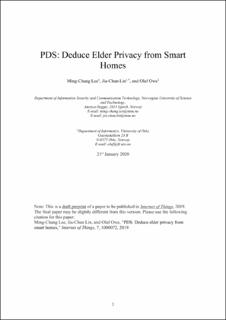PDS: Deduce Elder Privacy from Smart Homes
Peer reviewed, Journal article
Accepted version

Åpne
Permanent lenke
https://hdl.handle.net/11250/2649583Utgivelsesdato
2019Metadata
Vis full innførselSamlinger
Sammendrag
With the development of IoT technologies in the past few years, a wide range of smart devices are deployed in a variety of environments aiming to improve the quality of human life in a cost efficient way. Due to the increasingly serious aging problem around the world, smart homes for elder healthcare have become an important IoT-based application, which not only enables elders’ health to be properly monitored and taken care of, but also allows them to live more comfortably and independently in their houses. However, elders’ privacy might be disclosed from smart homes due to non-fully protected network communication. To show that elders’ privacy could be substantially exposed, in this paper we develop a Privacy Deduction Scheme (PDS for short) by eavesdropping sensor traffic from a smart home to identify elders’ movement activities and speculating sensor locations in the smart home based on a series of deductions from the viewpoint of an attacker. The experimental results based on sensor datasets from real smart homes demonstrate the effectiveness of PDS in deducing and disclosing elders’ privacy, which might be maliciously exploited by attackers to endanger elders and their properties.